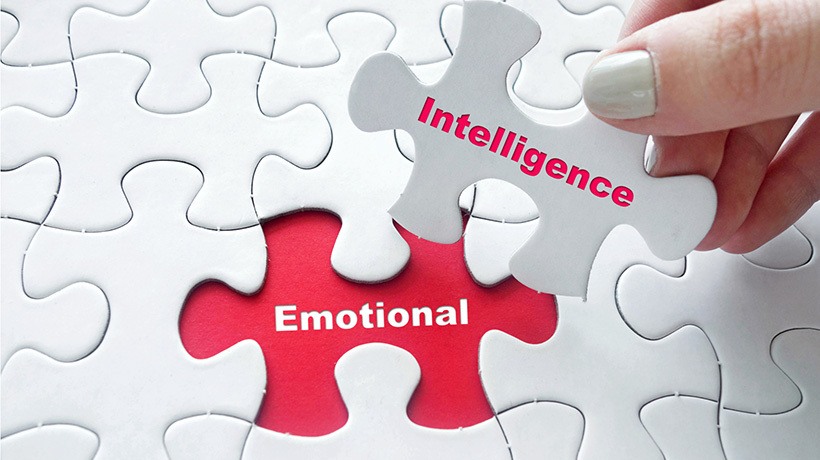Inquiry Deepens Emotional Intelligence
Emotional intelligence means being aware of our emotional state as it pertains to the situation we find ourselves in. When we are emotionally intelligent, we know that we feel emotion, we can name it (relatively) accurately, and we can express it in non-harmful ways. We do not have to become the emotion and feel overwhelmed by it. When we are emotionally intelligent like this, our emotions give us information about how we perceive our place in the world, at that moment. They are a mirror of our thinking about the world. We can then use this information to make choices that support ourselves and others.
When emotion is suppressed, even if only partly, we no longer have access to all the relevant information. We suppress emotion because the information it tries to convey seems uncomfortable. When we do this, the emotions are bottled up. Because we refuse to fully look at the situation, our perception of the situation stays the same, and the same emotions continue to be suppressed. Their energy builds up until it eventually finds a way out. It will be expressed either as the same emotion or as a different emotion.
The Emotion We Are Going To Suppress Most Likely Right Now Is Fear
In situations like this COVID-19 pandemic, we are going to feel threatened on many different levels. Our lives have been uprooted in the last few weeks, or months, and nothing is quite the same. Change is always unsettling. Even if we stay informed, and are realistic, and in good health, we are going to experience a measure of fear.
Fear is a primal emotion and is concerned with survival. When fear rises we want to move away from the fearsome thing, and right now that's not possible. We will try to reason ourselves and our loved ones out of feeling this fear. Fear is very uncomfortable. Not facing it, we can still feel the energy being bottled up. We fear that it might turn into panic in ourselves or others. And we don't face it because we don't know how to face it safely.
Suppressed Emotions Over Several Weeks Turn Into Stress
Stress harms our immune system. It also harms our relationships and our peace of mind.
Stress can also be seen as an alarm bell that lets us know that we believe in stressful thoughts right now. With Inquiry, we can face our fears while being held in a safe process. The "4 Questions and Turnarounds of Inquiry" (The Work of Byron Katie) create a safe container that allows us to travel into the darkness that scares us. The questions hold us in experiencing the fear in a safe container. They help us find our truth. Inquiry goes beyond positive thinking into actively educating our minds to the truth of what it is that we believe and fear so deeply. On the other side of investigated thinking, we find a reality that is supportive and kind.
My county has just announced the first confirmed case of COVID-19. The waiting is over, the tide has arrived. Although I know that I have little reason to be scared, for me, I experience a rush of fear. There are several thoughts behind this fear (seen as hazy images in my mind).
- "They will infect me."
- "We will be very sick."
- "I will be weakened."
- "My kids will die."
Because I'm aware that these beliefs are relatively unreasonable I try to push them away. Because I do Inquiry as a daily practice, I then notice the alarm bell of stress and decide to look at them.
Inquiry: 4 Questions And Turnarounds
Scenario: "They will infect me."
1. Is It True?
The answer to Q1 is yes or no only—one syllable. And notice how your mind wants to reason, justify and argue. It feels true to me: "Yes, they will infect me."
2. Can I Absolutely Know This Is True?
The same question with a slightly different emphasis. Again, answer yes or no only. My answer is "No. I cannot know this absolutely."
3. How Do I React, What Happens When I Believe This Thought?
Explore.
They will infect me.
I freeze and stop breathing. The phone call from the county arrives as we are to sit down to dinner. There is the first confirmed case. I breathe very shallow, very little. In my mind, I see all the people I saw today who didn't practice proper social distancing. I experience a rush of anger toward them. They are so irresponsible! That is how we will all get sick.
My body feels slightly shivery, weak. I feel like I've been pushed in the chest and winded. I cast my eyes down, try not to look at my kids and husband. I feel anxious, tense and vulnerable.
One of the kids comments and I hear myself quickly reassure them: "No, no, it's all fine, don't worry." I'm patronizing and not entirely honest. Trying not to panic, I see panicking people in my mind. I'm angry at these people who panic, and the ones who don't take this seriously. I feel threatened by them even more than by the virus.
During dinner, I try to be cheerful and act "normal" but my thoughts drift back to the epidemic.
4. Who Would I Be, In The Same Situation, Without This Thought?
Imagine.
Without this thought, I am clear that this sick person is not in my kitchen, house, or town. Right now I'm perfectly safe. My body is relaxed, my breathing normal.
I can embrace the kids' questions fully, I can allow myself to hear and honor their anxiety and worry. We reiterate our family's social distancing rules. We take our vitamins. We eat well and sleep early. We express our gratitude for our health and wealth right now through a dinner blessing.
We do the best we can, and I am aware that at some stage we will probably get sick from this new virus. It's not under my control, and that, too, is ok. We take one day, one moment at a time. After we have discussed, the COVID conversation drifts to other things, and I'm present with that, too.
After the 4 Questions, we turn the thought around. The process is a literal turnaround, followed by a search for honest examples of how this new version could be as true, or more true in the same situation.
The Turnaround
1. Turnaround To The Opposite
"They will infect me."
"They won't infect me."
How could that be as true?
Most likely the person who'll infect me will not be this same person we just heard about. No one may infect me this time around. We've been fairly diligent so far, I'm a health professional and aware of isolation rules. I'm in good health.
Who are "they"? In my mind, it's the people in my town and surroundings. There are at least as many being cautious as not cautious. These won't infect me.
2. Turnaround To The Other
"I will infect them."
That's just as likely. It is a highly infectious virus and I'll still have to go shopping. This can go either way and in all kinds of ways. This virus will break down a lot of experienced boundaries between us, it won't distinguish between worthy and not. Someone might infect me, and then I'll most certainly infect others.
3. Turnaround To Myself
"I will infect myself."
I do that in my thinking. The ways of thought are incredible—long before the real thing ever happened, I had infected myself a thousand times in my thinking already. I play the scenario over and over and worry about it. And the same will happen after the infection if I don't inquire into my thinking. The only way I know to allow thoughts to let go of me is by inquiring into their truth.
Inquiry Helps Me Look At My Emotions And Understand Them
After this Inquiry, I feel calm. I'm aware of all the information. I also know that I'm not in control. Life will happen as it will, and I'll respond by facing it, whatever it brings. Inquiry is a safe haven when I feel stressed, anxious or worried.
In the process of Inquiry, we allow ourselves to experience what we think and feel. We deepen our emotional intelligence considerably. In Q4, we explore reality without our stressful thinking. In the turnarounds, we open our minds to different possibilities. Thus, the mind is educated to its self-imposed limitations. By shining the light of understanding into the dark corners of our fears they are becoming much less frightening. Our bodies relax, our breath lengthens.
Inquiry is a powerful tool to support mental health in crises such as the COVID-19 pandemic. By questioning our thinking we deepen our emotional intelligence. The challenge becomes a gift for personal growth. We can stand tall, reach out, and support ourselves and others.








